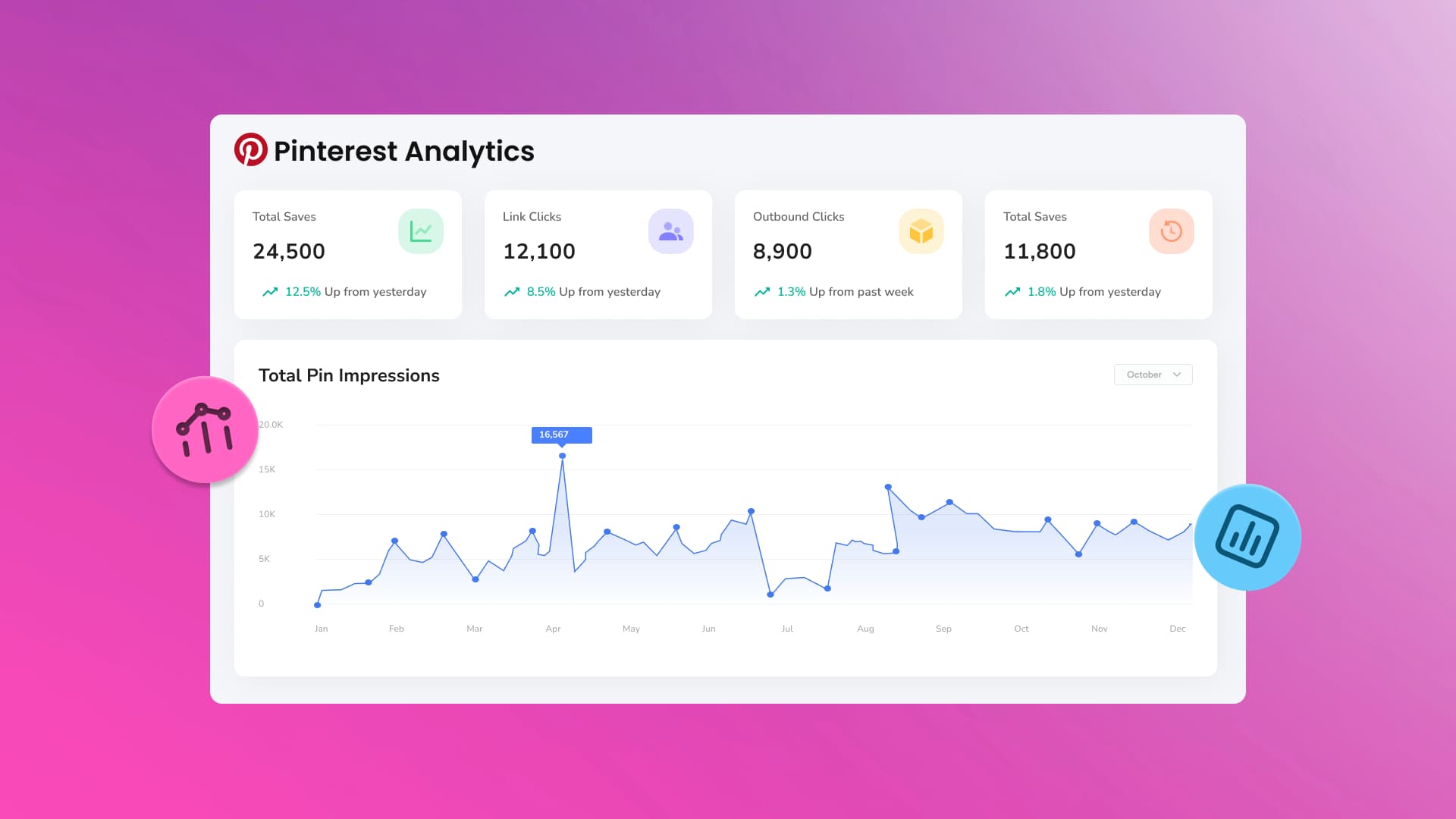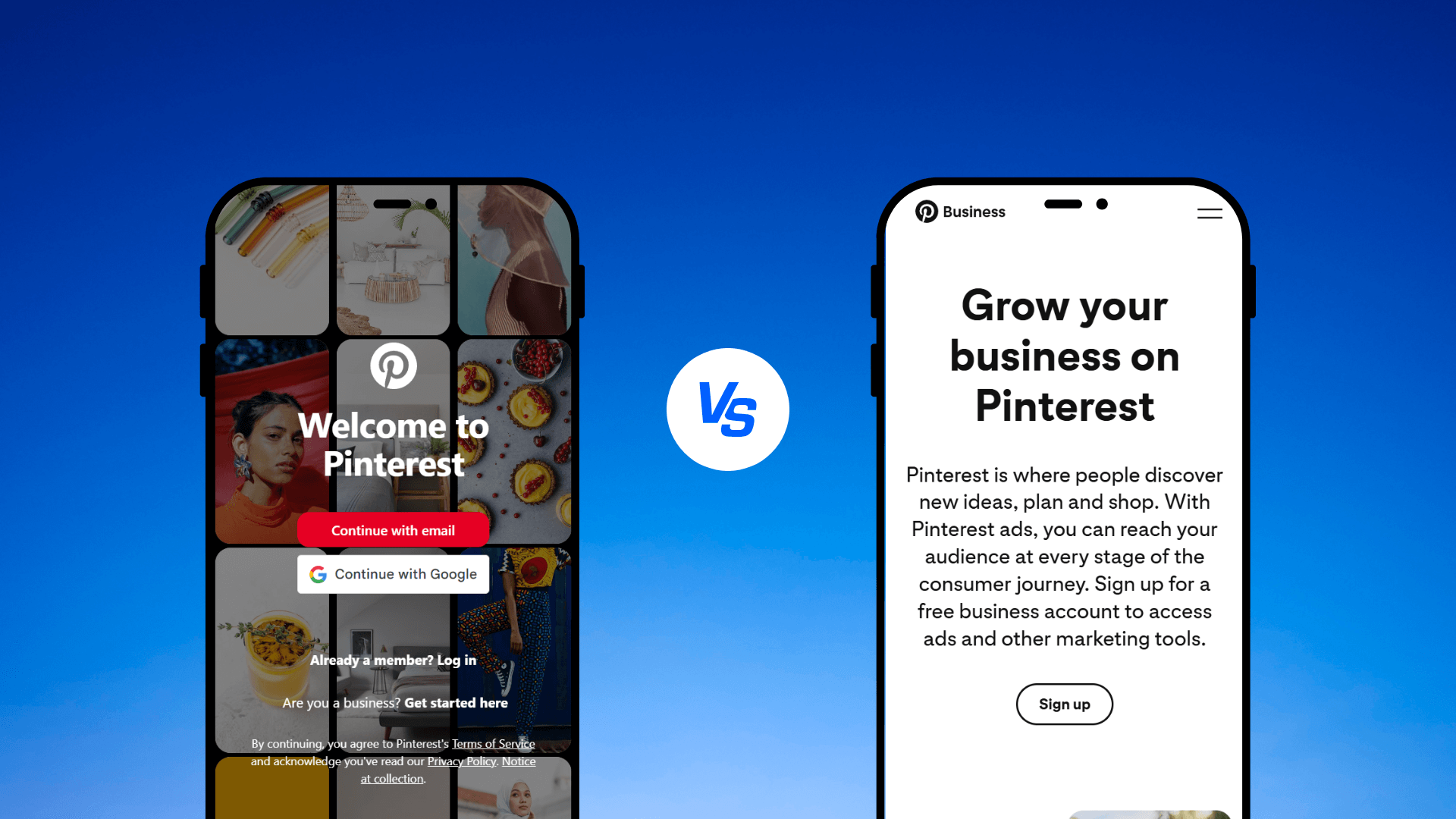New

Turn Your DMs Into Lead Gen!
Learn how to collect lead data from your DMs such as email addresses, phone numbers, and more right from your social inbox. If you are not yet automating your DMs your competitors are outpacing you.

How Something Social Saved 75% of Their Time and Increased Revenue by 15%
See how a fast-growing agency improved operations, cut down hours of manual work, and unlocked new revenue opportunities with Vista Social.
New

50 Unique Social Media Ideas for Consistent Content Creation
Discover 50 unique social media post ideas to engage your audience, grow your brand, and maintain a consistent content strategy with ease!
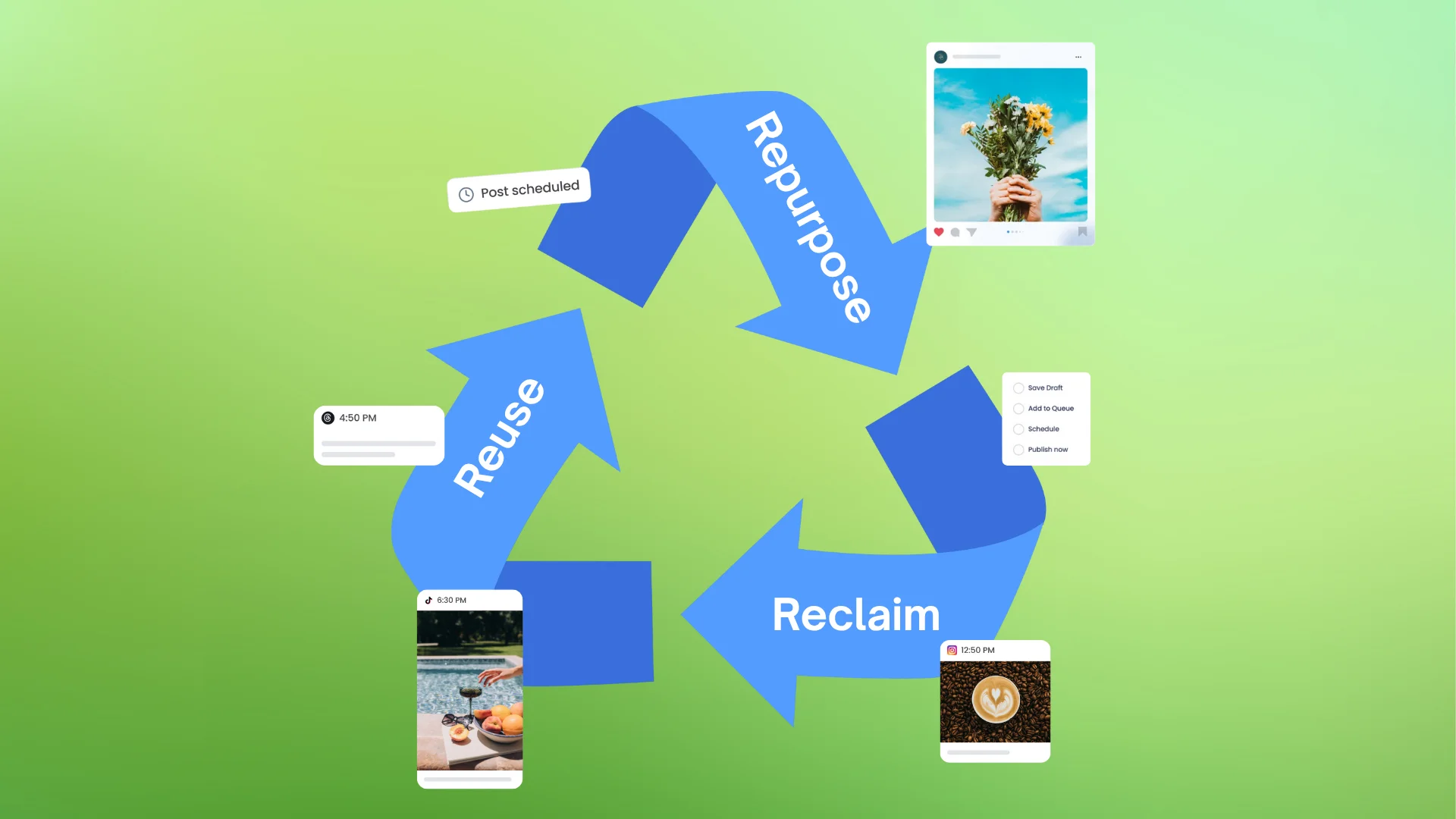
Mastering Content Reuse: The Key to a Consistent and Sustainable Posting Strategy
Published on January 29, 2025
10 min to read
How to Use Pinterest Analytics to Drive Traffic and Sales
Summarize with AI
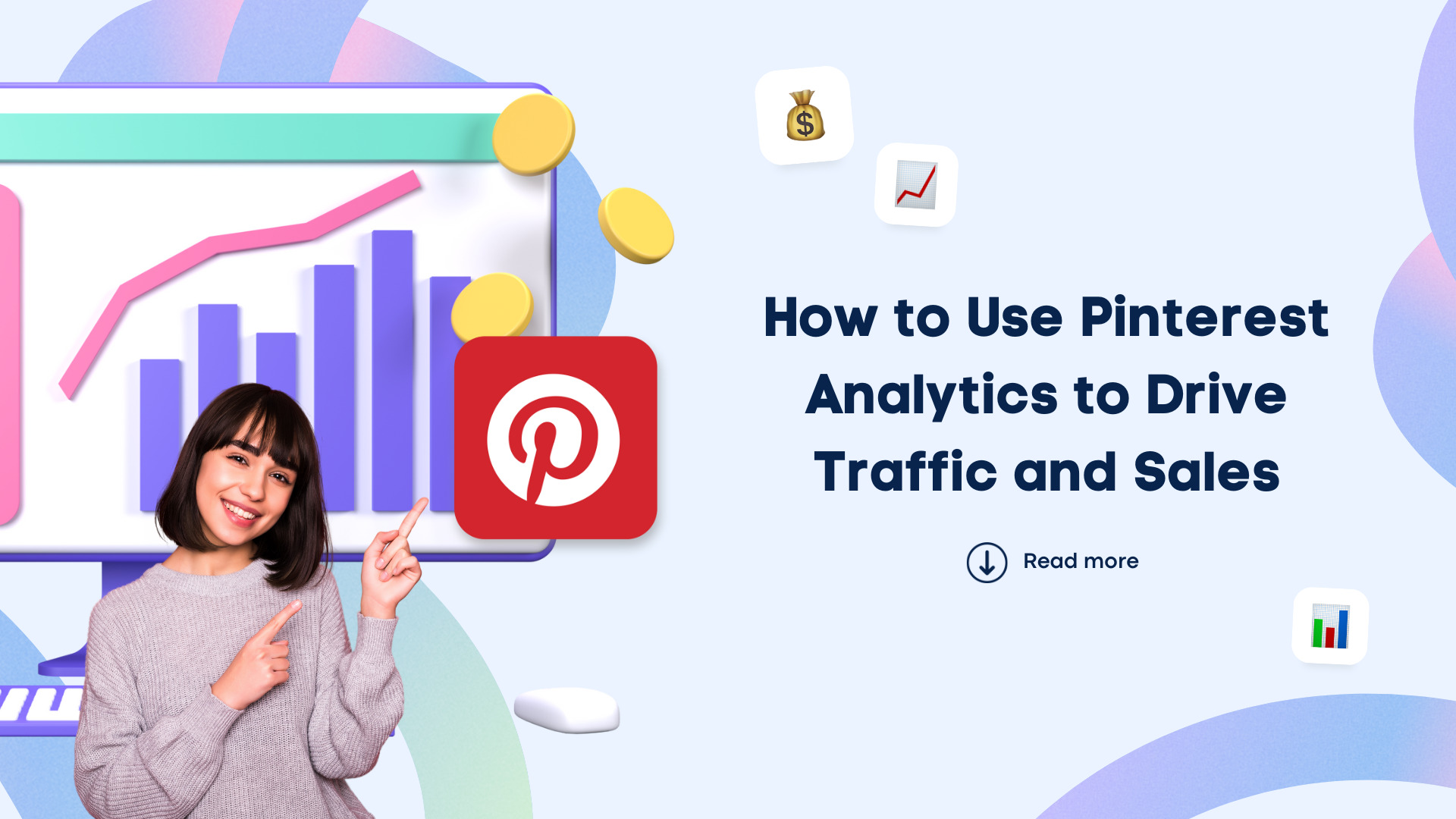
Summarize with AI
ChatGPT
Claude
Perplexity
Share
Vista Social
X (Twitter)
Table of contents
Summarize with AI
ChatGPT
Claude
Perplexity
Share
Vista Social
X (Twitter)
Turning Pinterest analytics data into actionable insights is no easy feat.
After all, you must know how to effectively extract volumes of data insights and use them to generate traffic from Pinterest to your clients’ product pages to drive sales.
The good news is that Pinterest provides built-in analytics tools to help you derive these valuable insights.
So, how do you use Pinterest Analytics to boost your clients’ traffic and sales?
This guide has the answers.
We’ll walk you through the easy steps and tried and true tips to leverage Pinterest Analytics to optimize your efforts to deliver your clients’ expected results.
Let’s dive right in.
Table of contents
What you will learn
- What is Pinterest analytics?
- Why use Pinterest Analytics
- Steps and tips to use Pinterest Analytics to increase traffic and sales
- How to use Vista Social for Pinterest analytics
- FAQs on Pinterest Analytics
- Make the most of Pinterest analytics to drive better results
What is Pinterest analytics?
Pinterest Analytics is a tool that helps users track the performance of their content on the platform.
The tool offers insights into key metrics, which you can leverage to:
- Understand how audiences interact with your clients’ Pins
- Optimize your Pinterest marketing strategies
- Make data-driven decisions to enhance the effectiveness of your content to help your clients’ reach their Pinterest marketing and sales goals
Why use Pinterest Analytics
Harnessing the power of Pinterest’s analytics feature can offer the following benefits.
- Measure content performance. Pinterest Analytics can track key metrics such as engagement, clicks, and impressions, allowing you to assess the effectiveness of your clients’ campaigns and content (Pins)
- Enhance content visibility. Pinterest Analytics helps you uncover how other users find and share your clients’ content, giving you the information you need to boost their content’s visibility and reach
- Optimize your content strategy. Pinterest’s analytics feature can help you spot your clients’ high-performing Pins and, in turn, the strategies that work best or need improvement
- Improve engagement. You can learn which of your clients’ Pins drive the most engagement via Pinterest Analytics. With this data, you can easily replicate successful content and engage your clients’ audiences more effectively
- Monitor competitors. Pinterest Analytics helps you track the performance and strategies of your clients’ competitors. It can help you develop content and strategies to keep your clients’ remain competitive
- Inform your advertising strategies. Leveraging Pinterest Analytics can help you derive insights that you can use to make informed decisions on where to allocate your advertising resources for maximum impact
- Understand audience behavior. The platform’s analytics tools can give you insights into which content resonates best with your target audiences. The information can help you tailor your clients’ Pins to audience preferences and interests. Essentially, the insights help you create content that engages and entices followers to visit your clients’ product pages and buy their products
Must read: 20+ Social Analytics Tools in 2025: Free And Paid
Steps and tips to use Pinterest Analytics to increase traffic and sales
How you use Pinterest Analytics depends on your clients’ specific goals, campaigns, and strategies.
While there is no one-size-fits-all approach, the steps and tips below can help you get a running start.
Review your Pinterest marketing goals
Review your clients’ goals before diving into your Pinterest content performance and engagement data.
This way, you’ ’ll know which key metrics and insights to look for to determine the success of your efforts and whether they contribute to achieving your clients’ traffic and sales objectives.
Access Pinterest Analytics
Once you have a good idea of what success looks like, it’s time to access the analytics features within Pinterest.
Start by ensuring your client uses a Business Account to gain access to the analytics feature.
Select the Menu in the top-left corner once you are logged in to your client’s Pinterest Business Account.
Click Analytics overview under the Analyze performance tab.
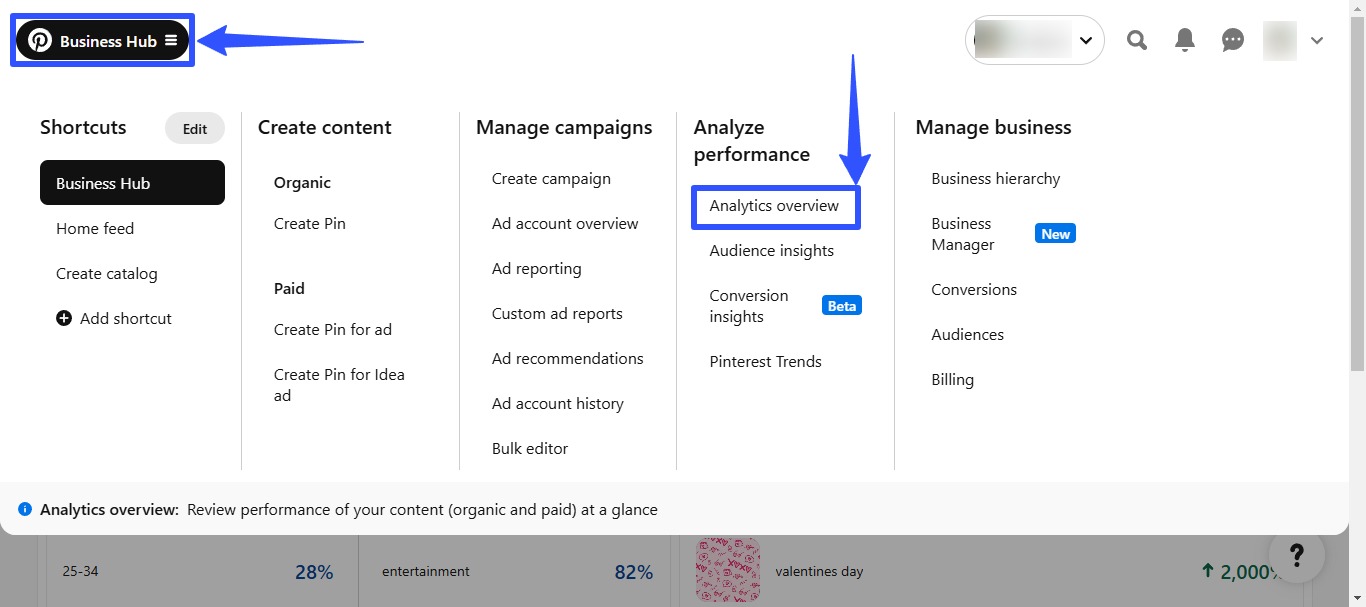
Click Overview on the left-hand side.
Here, you’ll see key metrics summaries and visualizations on the following:
- Overall performance
- Performance over time
- Top Pins
- Top boards
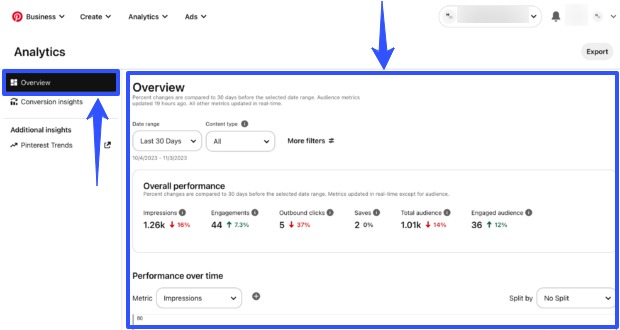
You can set the date range and content type and apply filters to view the specific metrics and data you want to see.
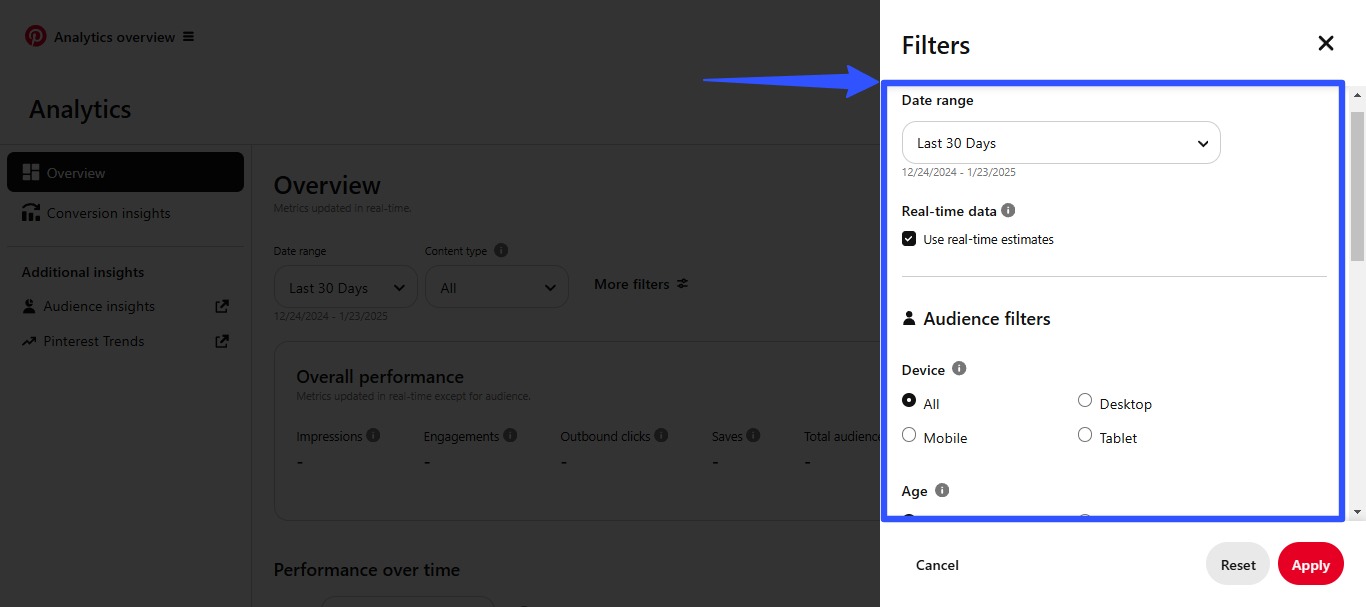
Click the corresponding options to view Conversion insights, Audience insights, and Pinterest trends.
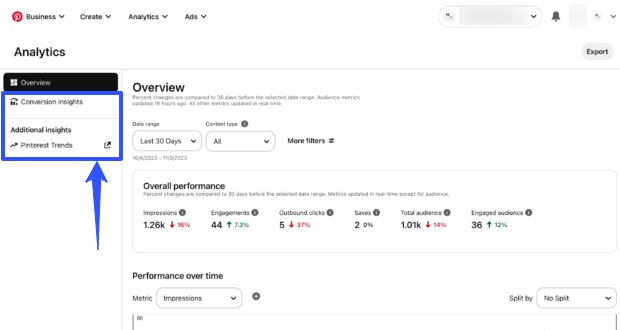
Focus on key metrics
Pinterest Analytics can give you real-time views of many metrics.
Must read: 10 Facebook Analytics Tools Used by Top Marketing Agencies
The key is to focus on the metrics that indicate the success of your efforts to drive traffic and sales for your clients.
Impressions
Impressions refer to the number of times your clients’ Pins are displayed on Pinterest. High impression rates indicate good visibility and reach.
If your Pin promoting a blog post about summer fashion gets 50,000 impressions, it means that 50,000 users saw it, increasing the chances of engagement and traffic to your client’s blog.
Engagements
Engagements encompass all the user interactions with your clients’ Pins, including saves, clicks, comments, and close-ups.

High engagements usually show that your clients’ content resonates with their audiences.
For instance, if your client’s recipe Pin gets 5,000 engagements, users actively interact with it by saving, commenting, or clicking through to their recipe website.
Saves
Saves measure the number of times users save your clients’ Pins to their boards.
Tracking the metric can help determine whether your clients’ content spreads organically as other users share and re-pin it.
Suppose your client’s DIY home decor Pin is saved 2,000 times. It means that users find it valuable enough to save and share, increasing its reach and potential traffic to your client’s site.
Pin Clicks
Clicks are the total number of times users click on your clients’ Pins.

The metric is crucial for understanding the number of people interested enough to learn more about your client’s content.
For example, a Pin promoting your client’s new product with 1,200 clicks shows strong audience interest.
The high interest can drive users to your client’s product pages to get more details or make a purchase.
Outbound Clicks
Outbound clicks track the number of times users click on your clients’ Pins and are directed to their websites and other channels outside the platform.
The metric is directly linked to driving traffic and potential sales.
For instance, if a Pin for your client’s online course has 800 outbound clicks, it means that 800 users visited their course landing page.
More clicks means more visits, which increases the likelihood of conversions.
Conversion Rate
Conversion rate is the percentage of users who take a desired action, such as buying a product or signing up for a newsletter, after clicking through your clients’ Pins.
The conversion rate helps measure the effectiveness of your clients’ Pins in driving sales.
Suppose that out of 500 clicks on your client’s Pin, 50 users make a purchase. With this, your conversion rate is 10%, indicating a successful Pin that drives sales.
Top Performing Pins
Identify which Pins perform best based on impressions, engagements, saves, and clicks. Analyzing these Pins can give you insights into what content works best.
For instance, if your client’s travel destination Pin consistently ranks as a top performer with high impressions and saves, you can create more similar content to attract and engage their audience.
Audience Insights
Audience insights provide valuable information about the demographics and interests of your clients’ audiences.
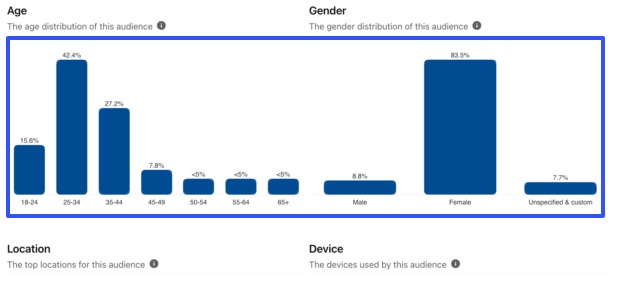
Understanding your target audience helps you tailor your content and strategies to their preferences, which helps drive engagement, traffic, and sales.
For example, if your audience insights reveal that most of your client’s followers are women aged 25-34 interested in fitness, you can create more fitness-related Pins to cater to this demographic.
Engagement Rate
The engagement rate is the ratio of engagements to impressions.
A high engagement rate indicates that your content appeals to those who see it.
For instance, a Pin with 10,000 impressions and 1,500 engagements has a 15% engagement rate, showing that it effectively captures and maintains audience interest.
Traffic Sources
Traffic sources reveal where your clients’ traffic comes from, whether organic, paid, or from specific boards.
Knowing your client’s traffic sources helps you refine your strategy accordingly.
If most of your client’s traffic comes from organic search on Pinterest, you can focus on optimizing their Pins for Pinterest SEO to boost visibility and engagement.
Assess top performers
Look closely at which of your clients’ Pins receive the highest engagement by checking impressions, saves, clicks, and comments to identify your most popular content.
After identifying the top-performing Pins, start looking for common themes.
Pay attention to the colors, topics, and formats winning over your client’s audiences.
Are your audiences more attracted to bright, vibrant images or more subdued tones?
Do they prefer how-to guides, inspirational quotes, or product showcases?
Take detailed notes on these patterns.
The analysis helps you understand what resonates with your clients’ audience and why, allowing you to replicate successful elements in future content.
Dive into audience insights
Understanding your audience is crucial to creating content that resonates with them and drives them into action, such as visiting your client’s product pages and purchasing.
Start by exploring their demographics, including age, gender, and location.
The data helps you identify your clients’ primary audience and tailor your content to meet their needs.
But don’t stop there—dig deeper into audience interests and behaviors.
What are they passionate about?
What types of Pins do they engage with the most?
What are their common hobbies or preferences?
These insights can guide you in creating content that speaks directly to your audience’s interests and desires.
Understanding your audience can help clients connect with and build a loyal and engaged Pinterest community.
Optimize your content
Now that you clearly understand what works for your clients’ audiences, it’s time to double down on those successful elements.
Create more of the content that resonates with their followers.
Follow the time-tested tips below.
- Use high-quality, visually appealing images that stand out in users’ feeds. The more eyeballs are on your clients’ Pins, the more opportunities to engage and lead them to your clients’ sites and drive sales
- Create compelling descriptions for your clients’ Pins. Make them informative and engaging, and include a Call-to-Action (CTA) that encourages users to click through to your clients’ websites or take another desired action
- Incorporate relevant keywords into your descriptions. Keywords help improve the discoverability of your clients’ Pins through Pinterest’s search feature, making it easier for users to find your client’s content
Consistently optimizing your content ensures that it stays fresh and engaging.
Also, regularly update your clients’ Pins to reflect new trends, seasonal themes, or current events.
Keeping your clients’ content relevant and timely can keep your audiences interested and returning for more.
Continue tracking content performance and tweak your clients’ Pins and campaigns accordingly.
How to use Vista Social for Pinterest analytics
One of the most efficient ways to analyze your clients’ Pinterest data is through Vista Social.
The social media management platform can track, analyze, and automatically generate your Pinterest reports.
The platform’s Pinterest metrics for Social Media Performance Report include the following:
- Summary of followers, pins, engagement, clicks, saves, and impressions
- Audience growth
- Total number of total pins
- Impressions
- Engagement
- Clicks
- Saves
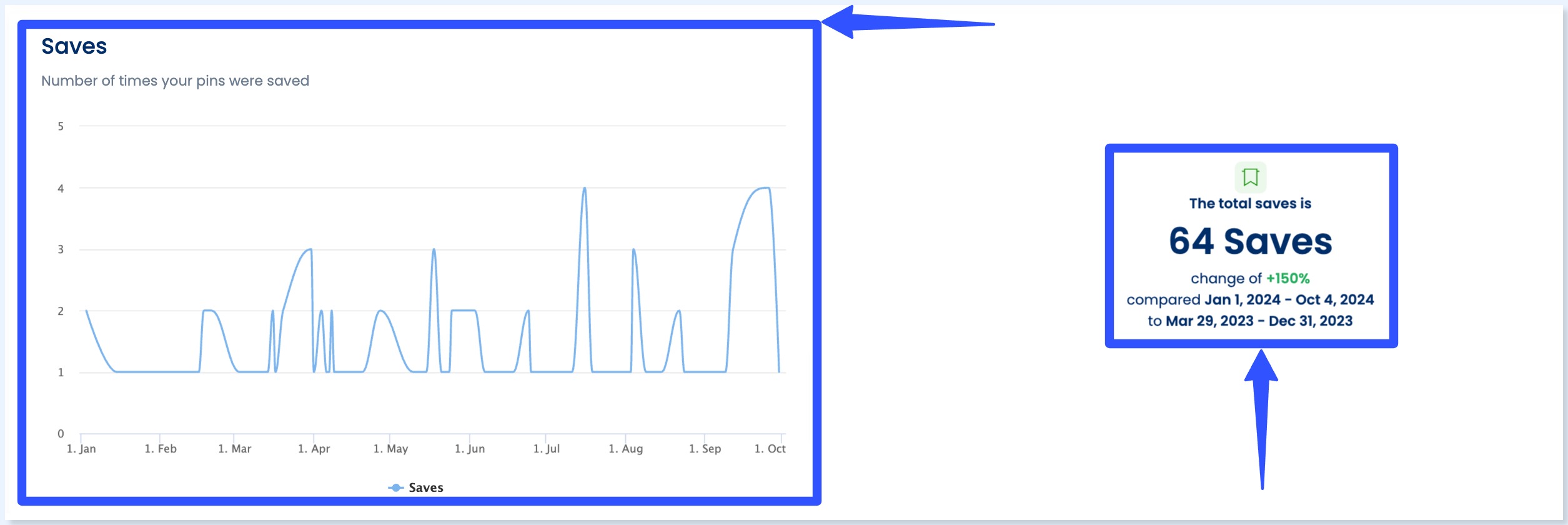
Vista Social also offers Pinterest metrics for Post Performance Report, including the following.
- Summary of posts, impressions, engagement & engagement rate
- Posts by network
- Total posts and Engagement by label
- Posts performance

Vista Social lets you create custom report templates to help you drill down into specific metrics and insights.
Must read: Mastering Social Media Analytics: How to Create Custom Reports
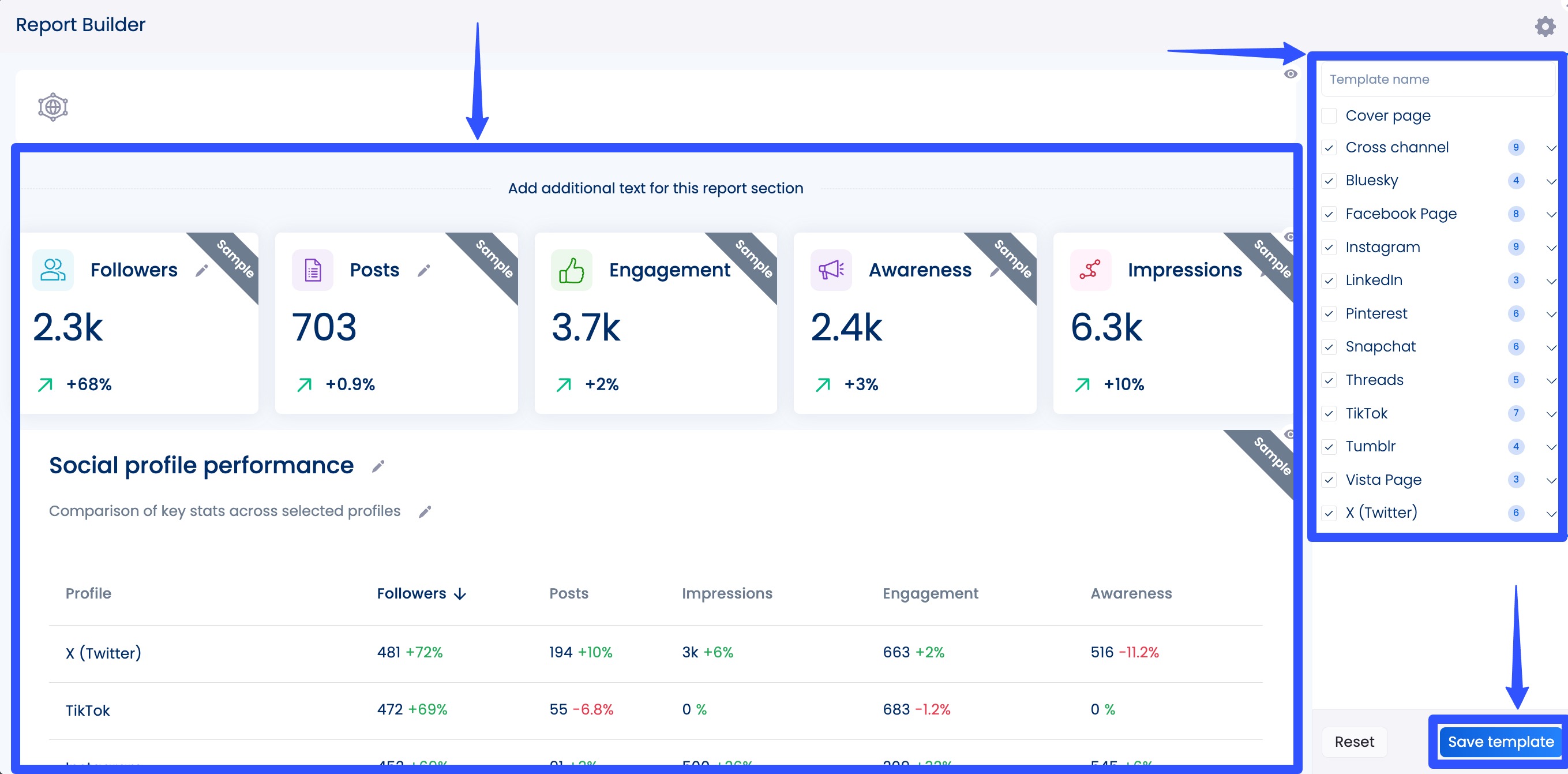
You can also schedule your Pinterest and other social media reports to generate and send to other users, such as your clients, via direct links or export them as PDF or CSV files.
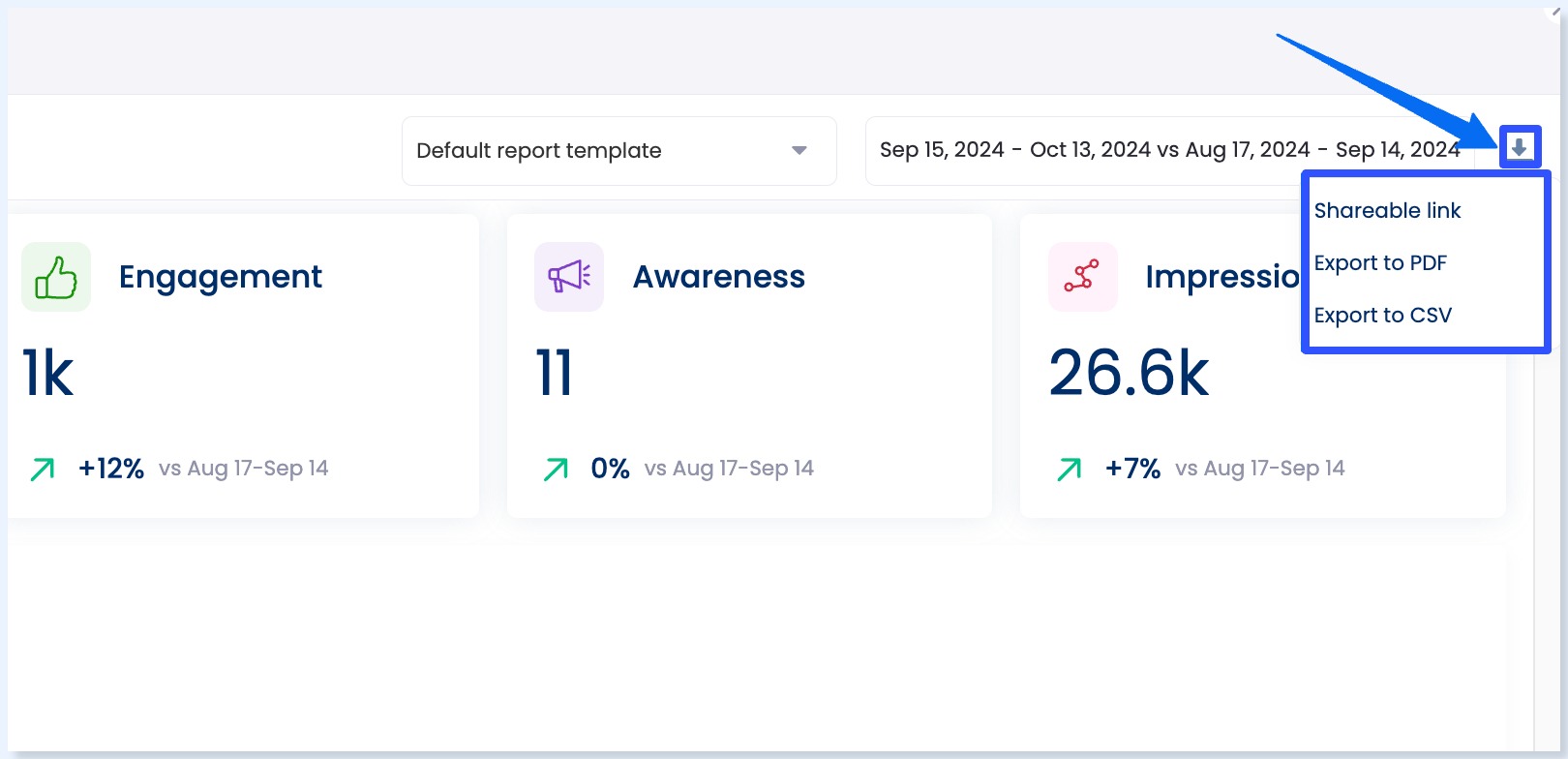
Must read: 20+ Sentiment Analysis Tools for Agencies & Brands for 2025
Besides Pinterest reports, the platform offers other reports on competitor analysis and sentiment analysis.
Must read: Social Media Sentiment Analysis: A Comprehensive Guide
Leverage Vista Social’s Pinterest management tools for business to manage and streamline all your core tasks, from publishing to engagement management.
The tools include the following.
- A Publisher that helps you create, customize, and schedule your clients’ Pinterest posts
- A shared content calendar for seamless post planning and management
- A Social Inbox that unifies all your clients’ Pinterest interactions and simplifies engagement management
- Post boosting
- An AI Assistant that generates and refines post descriptions and taglines
- Approval workflows
- Optimal posting time suggestions
- Bulk scheduling
- Social listening
- Content finder
- Hashtag tools
- Etc.
Must read: Hashtag Analytics Guide: With Tips, Tools, and Strategies
FAQs on Pinterest Analytics
Can you integrate Pinterest Analytics with Google Analytics?
Yes, you can integrate Pinterest Analytics with Google Analytics to gain deeper insights into your audience and their interactions with your client’s content.
Must read: Snapchat Analytics Ultimate Guide: What to Track, FAQs, Etc.
The integration lets you track how Pinterest traffic contributes to your clients’ overall website performance and conversions.
What is the difference between organic and paid performance in Pinterest Analytics?
Organic performance refers to the visibility and engagement your clients’ Pins achieve without paid promotion.
On the other hand, paid performance involves the results from promoted Pins or ads.
Tracking both helps you understand the impact of your marketing efforts and optimize your budget allocation.
How often should you check your Pinterest Analytics?
It depends, but generally, it’s best to check your clients’ Pinterest Analytics regularly, at least once a week.
Doing so helps you stay updated on your client’s Pinterest content performance and adjust your strategies promptly.
Must read: Instagram Reels Analytics Ultimate Guide: Tips & Examples
How do you check your Pinterest Analytics on mobile?
Open the Pinterest app and log in to your client’s business account.
Tap your client’s profile picture at the bottom right.
Next, tap the chart bar icon at the top-left corner to access Analytics. You can view your client’s Pinterest content performance metrics and insights from there.
Can you track the performance of individual Pins?
Yes, you can track individual Pin performance in Pinterest Analytics.
You can look at metrics such as impressions, engagements, saves, clicks, and outbound clicks for each Pin to understand how well it’s performing and why.
How can you use Pinterest Analytics to improve your content strategy?
You can use Pinterest Analytics to identify which types of content resonate most with your clients’ audiences.
Analyze top-performing Pins to understand common themes and elements that work well.
You can use these insights to create more of the content that your clients’ audiences love and continuously refine your strategy based on data-driven insights.
How often should you update your Pinterest content?
It depends on your strategy and clients’ campaigns and goals.
Generally, your best bet is to update your clients’ Pinterest content regularly, at least once weekly.
Consistent updates keep your clients’ content fresh and engaging, which helps maintain audience interest and drive website traffic.
Make the most of Pinterest analytics to drive better results
Pinterest Analytics can be a powerful tool to extract key insights to amplify your content strategies and clients’ campaigns.
Know the essential steps and hacks to use Pinterest Analytics effectively and efficiently.
Make your Pinterest and other social media platform analytics a breeze with Vista Social.
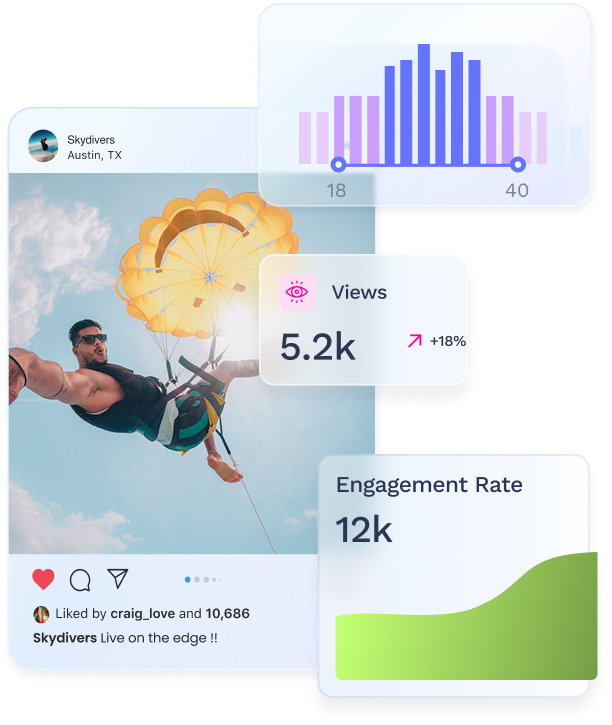
Try Vista Social for free
A social media management platform that actually helps you grow with easy-to-use content planning, scheduling, engagement and analytics tools.
Get Started NowAbout the Author
Content Writer
Jimmy Rodela is a social media and content marketing consultant with over 9 years of experience, with work appearing on sites such as Business.com, Yahoo, SEMRush, and SearchEnginePeople. He specializes in social media, content marketing, SaaS, small business strategy, marketing automation, and content development.
Read with AI
Save time reading this article using your favorite AI tool
Summarize with AI
Never Miss a Trend
Our newsletter is packed with the hottest posts and latest news in social media.
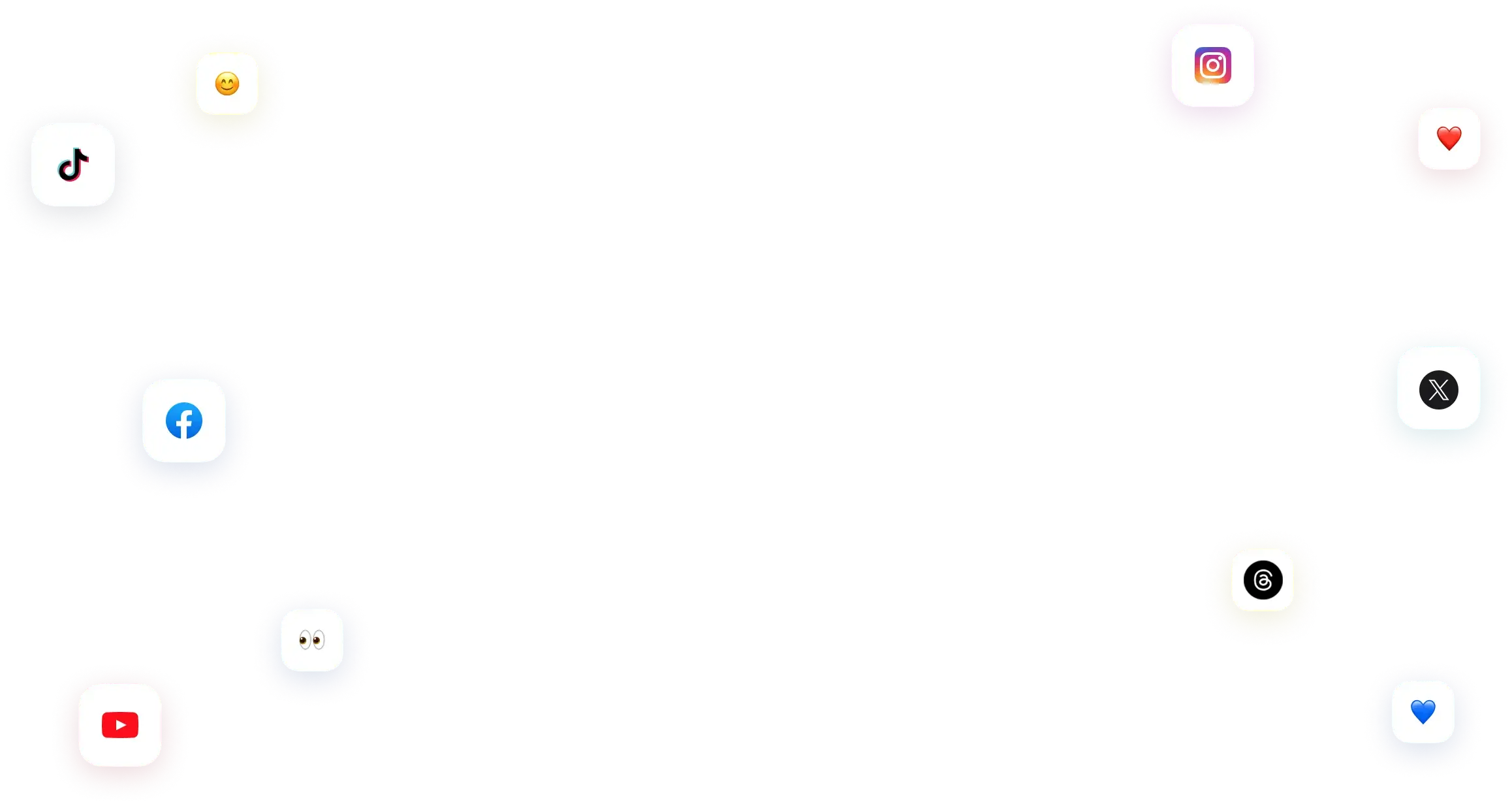
You have many things to do.
Let us help you with social media.
Use our free plan to build momentum for your social media presence.
Or skip ahead and try our paid plan to scale your social media efforts.
P.S. It will be a piece of cake 🍰 with Vista Social
Subscribe to our Newsletter!
To stay updated on the latest and greatest Social Media news. We promise not to spam you!
Enjoyed the Blog?
Hear More on Our Podcast!
Dive deeper into the conversation with industry insights & real stories.
